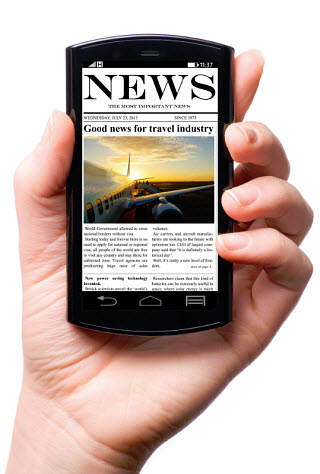A new global survey has found that the vast majority of air travelers are tech-savvy.
The survey, which was conducted jointly by Societe Internationale de Telecommunications Aeronautiques (SITA) and Air Transport World, revealed that while almost all of the surveyed passengers use some form of mobile technology when travelling, 77 percent of the 6,277 passengers surveyed would be content using wearables such as smartwatches and smart glasses to make their journey more interesting or to help them during their travels.
The survey focused on consumers travelling through the 30 top airports across the globe.
The global survey carried out by the aviation communication and IT firm based in Geneva and the aviation journal, showed that nearly every passenger (97 percent) had a smartphone, tablet or laptop with them when they flew and that one in five passengers surveyed travelled with all three of these devices. This finding alone highlighted the increasing importance of passengers who are tech-savvy.
Passengers want to be able to use mobile technology at every point of their journey.
 The survey also learned that air travelers want to stay connected at each part of their journey. The study found that 76 percent of respondents utilized airline apps and that of this same group, 43 percent said that the apps made a distinct improvement when planning their travels and during their travel experience.
The survey also learned that air travelers want to stay connected at each part of their journey. The study found that 76 percent of respondents utilized airline apps and that of this same group, 43 percent said that the apps made a distinct improvement when planning their travels and during their travel experience.
In addition, 54 percent of participants wanted there to be a greater investment in technology to assist them in comparing airline fares. Furthermore, 52 percent wanted in-flight wireless service and improved real-time flight information. Also, the survey revealed that 57 percent would like airport directions and maps and 53 percent wanted personalized alerts sent directly to their phones to notify them about any delays.
The survey clearly reveals that mobile technology is important to air travelers. According to Francesco Violante, the CEO of SITA, passengers who are tech-savvy “expect more personalised apps and services consistently delivered on the web, to their phone or tablet. New technologies like smart watches and glasses have now become commonplace and “they present a great opportunity for airlines and airports to engage directly with their passengers to provide efficient services throughout the journey.”

 Customers will be given the opportunity to use the Touch ID feature, which will allow them to take advantage of fingerprint recognition technology in conjunction with their password, in order to enhance the security of their smartphone banking experience. From there, the
Customers will be given the opportunity to use the Touch ID feature, which will allow them to take advantage of fingerprint recognition technology in conjunction with their password, in order to enhance the security of their smartphone banking experience. From there, the 